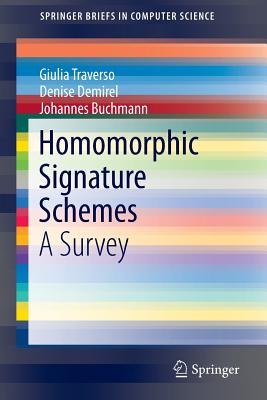You are here
Back to topHomomorphic Signature Schemes: A Survey (Springerbriefs in Computer Science) (Paperback)
$54.99
Usually Ships in 1-5 Days
Description
1 From Digital to Homomorphic Signature Schemes 1.1 Digital Signatures1.2 Digital Signature Schemes Security Definition1.2.1 Known-Message Attack1.2.2 Chosen-Message Attack 1.2.3 Adaptive Chosen-Message Attack1.3 Homomorphic Signature Schemes 1.4 Homomorphic Signature Schemes Security Definition2 Homomorphic Signature Schemes2.1 Homomorphic Signature Schemes for the Single-User Scenario2.1.1 Linearly Homomorphic Signature Schemes2.1.2 Homomorphic Signature Schemes for Polynomial Functions 2.1.3 Fully Homomorphic Signatures2.2 Homomorphic Signature Schemes for the Multi-Users Scenario2.2.1 Multiple Sources Homomorphic Signature Schemes2.2.2 Homomorphic Aggregate Signature Schemes3 Evaluation of Homomorphic Signature Schemes3.1 Hardness Assumptions3.1.1 Bilinear Groups3.1.2 RSA3.1.3 Lattices 3.2 Efficiency and Size3.3 Security3.3.1 Weak Adversary3.3.2 Strong Adversary3.4 Privacy3.5 Random Oracle Model vs. Standard Model
4 State of the Art of Homomorphic Signature Schemes4.1 Linearly Homomorphic Signature Schemes Defined Over Bilinear Groups4.1.1 Signing a Linear Subspace: Signature Schemes for Network Coding, by Boneh etal. (2009)4.1.2 Homomorphic Network Coding Signatures in the Standard Model, by Attrapadungand Libert (2011)4.1.3 Computing on Authenticated Data: New Privacy Definitions and Constructions, byAttrapadung et al. (2012)4.1.4 Efficient Network Coding Signatures in the Standard Model, by Catalano et al. (2012) 4.1.5 Improved Security for Linearly Homomorphic Signatures: A Generic Framework, by Freeman (2012)Signatures, by Attrapadung et al. (2013)4.1.7 Secure Network Coding Against Intra/Inter-Generation Pollution Attacks, byGuangjun et al. (2013)4.1.8 Summary of Linearly Homomorphic Signature Schemes Defined Over BilinearGroups4.2 RSA-Based Linearly Homomorphic Signature Schemes4.2.1 Secure Network Coding Over the Integers, by Gennaro et al. (2010)4.2.2 Adaptive Pseudo-Free Groups and Applications, by Catalano et al. (2011)4.2.3 Efficient Network Coding Signatures in the Standard Model, by Catalano et al. (2012) 4.2.4 Improved Security for Linearly Homomorphic Signatures: A Generic Framework, by Freeman (2012)4.2.5 Summary of RSA-Based Linearly Homomorphic Signature Schemes4.3 Lattice-Based Linearly Homomorphic Signature Schemes 4.3.1 Linearly Homomorphic Signatures over Binary Fields and New Tools forLattice-Based Signatures, by Boneh and Freeman (2011) 4.3.2 Lattice-Based Linearly Homomorphic Signature Scheme over Binary Fields, byWang et al. (2013)4.3.3 Summary of Lattice-Based Linearly Homomorphic Signature Schemes 4.4 Homomorphic Signature Schemes for Polynomial Functions 4.4.1 Homomorphic Signatures for Polynomial Functions, by Boneh and Freeman (2011)4.4.2 Homomorphic Signatures for Polynomial Functions with Shorter Signatures, byHiromasa et al. (2013)4.4.3 Homomorphic Signatures with Efficient Verification for Polynomial Functions, byCatalano et al. (2014)4.4.4 Summary of Homomorphic Signature Schemes for Polynomial Functions4.5 Fully Homomorphic Signature Schemes4.5.1 Leveled Fully Homomorphic Signatures from Standard Lattices, by Gorbunov etal. (2014)4.5.2.
